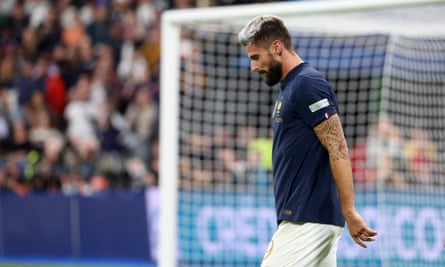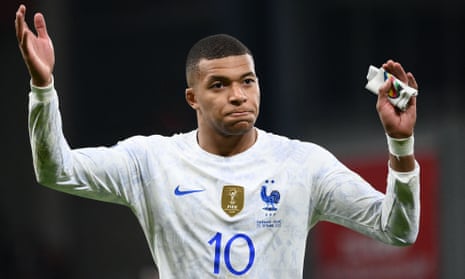With a swarm of controversies plaguing French football, many fans hoped that this international break would offer some brief respite and a chance for a focus on the actual game. But Didier Deschamps comes away from the final international break before the World Cup with more questions than answers.
Fatigue and injuries were factors, as they were in June, when Deschamps turned in his worst international break since taking charge. But the bigger picture for this year is damning: one win in six Nations League fixtures makes for grim viewing. A 2-0 victory over Austria on Thursday night ensured France were not relegated but any newfound optimism disappeared over the weekend when they were beaten 2-0 by Denmark in Copenhagen.
The ever-increasing injury list somewhat exonerates that performance but it is also a cause for concern. The mainstays of Deschamps’ reign are entering the twilight of their careers and the manager does not seem to know what to do next. The circumstances have forced him to draft in the new generation but it may be too little, too late for a cohesive unit to be formed before the end of November.
Karim Benzema, Hugo Lloris and N’Golo Kanté are expected to return to action over the next few weeks, but the densely-packed fixture list is likely to cause a few more casualties. And, given how unprepared France seem to be without their regular starters, an experimental lineup could go either way.
Raphaël Varane was rested for the Denmark game and the frailty of the defence without him was laid bare by Christian Eriksen’s masterful playmaking and the unrestrained directness of young forward Andreas Skov Olsen. Despite performing well for their clubs this season, William Saliba and Dayot Upamecano have some way to go before establishing themselves on the international stage.
The wing-back positions pose a similar problem. Since switching to a three-man defence, Deschamps has not found the ideal candidate to occupy the right flank. Benjamin Pavard’s limited attacking output and Jonathan Clauss’ lightweight performances make Kingsley Coman – who is currently on the sidelines with a hamstring injury – the only viable option as a starter.
Olivier Giroud, whose goal against Austria made him the oldest scorer in France’s history, bolstered his case for a place in the squad as he sought to forge a new and improved relationship with Kylian Mbappé – a year on from their public falling-out before the Euros. Mbappé even remarked after the Austria game that Giroud’s hold-up play frees-up space that he rarely sees while playing club football, in what seemed like a not very subtle dig at at least one of his teammates.
Given that Mbappé and Benzema – for all their talents and mutual understanding – often step on each other’s toes in the national team, Giroud may well be key for France once again as he can unlock Mbappé’s potential. Leaving the Ballon d’Or winner-in-waiting on the bench is unthinkable, but Giroud brings something to the table no other French striker can.

Photograph: Jean Catuffe/Getty Images
Some players may have lost their spot in the squad entirely with their performances this month. Eduardo Camavinga, who was back in the squad after two years with the Under-21s, was unable to counter the Danish dominance in midfield and consistently sprayed passes astray.
Fortunately, there are a few positives to take away from France’s final outings before they defend the World Cup in Qatar. Monaco midfielder Youssouf Fofana thrived alongside his former teammate Aurélien Tchouaméni – who is now establishing himself at Real Madrid – and looks to be part of the answer to Deschamps’ midfield tinkering, at least until Paul Pogba and Kanté return from injury.
Benoît Badiashile made a promising debut against Austria, but was then part of the collective shipwreck of a performance in Copenhagen. West Ham goalkeeper Alphonse Areola deputised reasonably well for the injured Mike Maignan and was largely responsible for keeping the scoreline respectable in Denmark, where his defence had deserted him. Whether any of these players have convinced the manager to take them to Qatar remains to be seen, but at least there is some positivity for the post-Deschamps era.
Like every other team in the tournament, France are on a tight schedule. Their squad will be announced on 13 November at the latest; the players meet up the next day; and then they fly to Qatar on 16 November. Like some of the other supposed favourites, France do not know what the squad will look like and how they will play. The difference is that French football’s time and energy over the next two months will be spent putting out other fires.
A repeat of the 2002 World Cup, where the defending champions went out in the group stage, remains unlikely. The apparent squad unity – a trademark of the Deschamps era and a lasting legacy of the mutiny at the 2010 tournament – is one of the team’s saving graces, even if one player has made every effort to stand out from the rest.
Mbappé, always one to push the boundaries of player-power into uncharted territory, ended up winning his fiery dispute with the French Football Federation (FFF) over image rights. The contention was over the contract signed by France internationals before their first call-up, which in his opinion leaves them with little control over which brands they can associate their image with. Mbappé took exception, in particular, to his image being used to promote fast food and betting outlets. Having, he claims, pushed the issue for years, the PSG forward managed to catapult the question to the fore in the March international break, when he boycotted Les Bleus’ sponsorship commitments.
The problem rumbled on for months until last week, when Mbappé announced he would again be skipping a photo session with the FFF’s partners. The governing body backed down on Monday evening, announcing that they had consulted with the players and would be open to rewriting the terms of the agreement.
Admirable (albeit selective) as his stance may be, the move is indicative of the 23-year-old’s leading role in French football, for better or worse. Although Deschamps, Mbappé and the rest of the squad claim it was a team initiative, the move was clearly led by the forward – who says he also made the issue of image rights a central point in his PSG contract discussions – and the lethal blow was timed perfectly.
The dispute comes in a period when the FFF’s political stock and bargaining position are at an all-time low. The organisation’s reputation has taken a nosedive in the last few weeks after an investigation by So Foot alleged that sexual harassment was rife within the organisation, notably claiming that president Noël Le Graët had sent inappropriate text messages to younger female colleagues.
The Federation announced that it would sue the magazine for defamation, but not before the ministry of sports launched an investigation into it. Later revelations from journalist Romain Molina about 40 years’ worth of alleged sexual abuse cover-ups mired the federation in even more controversy. Le Graet says he will work with the inspection “in the greatest transparency”, while also brushing off rumours he could retire after the World Cup – two years before his contract ends in 2024. “If my health remains stable, if I’m well, there is absolutely no reason for me to stop,” he told L’Équipe. “I’m very good at my job and everyone likes me. I’m lucky to be appreciated.”
French football is no stranger to off-pitch scandals, but they have come thick and fast this year. Paul Pogba is allegedly the victim of attempted extortion by a group that he says includes his brother Mathias, who has accused the Juventus midfielder of using witchcraft to curse Kylian Mbappé and denies any involvement in the alleged extortion. Former PSG Women’s midfielder Aminata Diallo is currently under police investigation for allegedly ordering an attack on her former teammate Kheira Hamraoui, which took place last year, claims she rejects too.
Despite this chaotic backdrop, France will nevertheless go into their opening game against Australia on 22 November as one of the favourites. But things could unravel in the blink of an eye just as they did at the Euros last year, when Les Bleus crashed out to Switzerland in the last 16. France have already made a mess of one title defence this year in the Nations League. They look well on their way to doing the same in Qatar, unless Didier Deschamps can find quick answers to some burning questions while, all around him, French football collapses in on itself.
